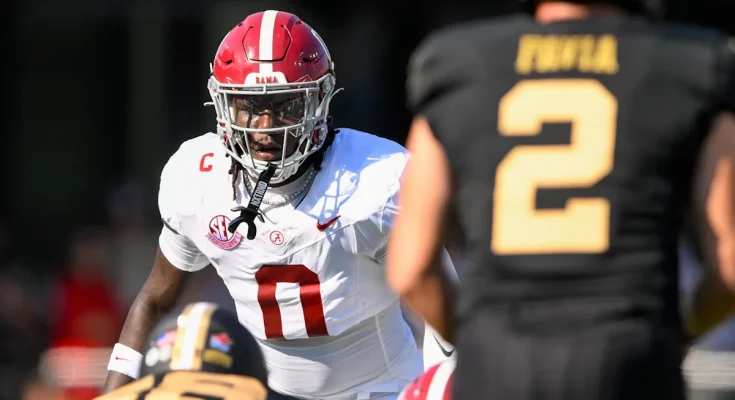Alabama football has never been just another program. It’s been a measuring stick, a dynasty, a national brand synonymous with dominance, process, and tradition. But all of that identity has long been tethered to one man—Nick Saban. So when the greatest coach in college football history announced his retirement in January 2024, the world naturally asked: what now? What does Alabama football look like without the general who made “The Process” legendary, who reeled in top recruiting class after top recruiting class, and who hoisted national title trophies like they were participation awards? Is the Crimson Tide still the Crimson Tide without Saban stalking the sidelines, adjusting his headset, and glowering under the lights of Bryant-Denny Stadium? That’s the million-dollar question every rival fan, analyst, and SEC hopeful is asking. But if you ask linebacker Deontae Lawson, the answer is simple: just wait and see.
For Lawson, this transition period is not a time for panic or posturing. It’s a time for proving, recalibrating, and—most of all—believing. He’s not buying into the national media’s claims that Alabama is done, finished, slipping into mediocrity like so many other bluebloods before them. In his words, “We’ll see when the game gets here.” And that’s not a quote filled with bravado. It’s filled with intent. Because Lawson, more than anyone else on this team, understands the weight of legacy and the urgency of now. He’s stepping into his final season in Tuscaloosa not just as one of the top defensive leaders, but as a guardian of the culture Saban built—and a bridge to the future under new head coach Kalen DeBoer.
DeBoer may not have Saban’s rings or SEC pedigree, but what he does have is a track record of winning, developing quarterbacks, and instilling a potent offensive system that made Washington a legitimate national contender in 2023. He’s already earned early respect from players like Lawson, who admit that while things are different under DeBoer, they’re far from dysfunctional. Change is inevitable in college football. The programs that fail to evolve get left behind. DeBoer’s version of evolution is rooted in explosive play design, aggressive quarterback play, and a fierce commitment to preparation—three things that, if paired with Alabama’s still-loaded defensive roster, could lead to more wins than many outside the state of Alabama are predicting.
Lawson knows that skepticism is part of the territory. Opposing fans want Alabama to fall. They’ve been waiting for it for more than a decade. Every close win was treated like a loss. Every loss was magnified into a supposed downfall. But Saban’s consistency denied that downfall year after year, no matter how many times ESPN tried to push a “changing of the guard” narrative. Now that Saban’s not around to swat those narratives away, critics are circling. And Lawson? He sees it all. He reads the tweets, hears the talking heads, and feels the questions surrounding the team’s identity. But instead of being discouraged, he’s motivated.
Deontae Lawson isn’t just another linebacker wearing crimson and white. He’s the kind of player that embodies Alabama’s blueprint—tough, disciplined, intelligent, and emotionally locked in. His rise from a solid recruit to one of the SEC’s best defenders mirrors the “earn it every day” ethos that Saban preached. Last season, Lawson notched 67 tackles, 5.5 tackles for loss, and 3 sacks despite battling injuries. His range, football IQ, and communication skills made him the nerve center of the Tide defense. He wasn’t the loudest voice, but he was one of the most trusted—by players and coaches alike. And now, with more responsibility falling on his shoulders, Lawson has emerged as one of the unquestioned leaders on a defense that is still stacked with elite talent.
That defense, which returns stars like Kool-Aid McKinstry, Malachi Moore, and emerging pass-rusher Keon Keeley, still looks like an Alabama defense on paper. Physical, deep, and loaded with NFL-bound talent. The challenge now is cohesion. Under Saban, defensive excellence was expected and drilled into every player’s DNA. With new defensive coordinator Kane Wommack coming in from South Alabama, there’s a fresh scheme to learn and new terminology to digest. But Lawson isn’t intimidated. He says the energy on defense is sharp, the accountability is intact, and the expectations have not dipped an inch.
That’s a crucial point—expectations. No one inside that Alabama locker room is playing the underdog card. They’re not interested in some redemption arc or proving people wrong for the sake of attention. They expect to win because they’ve been trained to win. Whether it’s Saban or DeBoer leading the team, that internal bar hasn’t moved. In fact, Lawson would tell you it’s higher than ever. Because now they’re fighting for something bigger: the right to continue the dynasty, to protect the legacy, and to silence every critic who thinks Alabama’s time has passed.
Make no mistake, the transition hasn’t been seamless. Saban’s retirement stunned everyone in the building, including Lawson. Many players considered transferring. The early weeks of January were filled with meetings, soul-searching, and tough decisions. But once DeBoer arrived and met with the team, there was a subtle shift. His approach was not to replace Saban—no one can—but to respect the foundation while offering a vision of his own. For veterans like Lawson, that balance was refreshing. It didn’t feel like a culture was being torn down. It felt like it was being evolved.
And that’s where the nuance of this new Alabama era comes in. Evolution is not abandonment. This isn’t a rebuild—it’s a recalibration. Lawson sees it that way. He talks about how practices still feel like Bama practices—demanding, detail-oriented, and fast-paced. He talks about how player-led accountability meetings are still happening. He talks about how leadership is emerging organically, not being manufactured by coaches. That’s culture. And culture doesn’t vanish when one man leaves. It lingers, morphs, and ultimately survives if the right people keep it alive. Lawson is one of those people.
That doesn’t mean there won’t be challenges. The SEC is brutal. Georgia is still a powerhouse. Texas is now in the mix. LSU, Ole Miss, and even Tennessee have tasted enough recent success to feel emboldened. The road back to Atlanta will be grueling. But Alabama’s schedule, while difficult, also provides opportunity. Early tests will come. And that’s when Lawson’s words—“we’ll see when the game gets here”—will become more than a soundbite. They’ll become a rallying cry.
It’s also worth remembering that Alabama’s recruiting machine hasn’t shut down. The 2024 class may not have ranked first, but it’s still loaded with four- and five-star talent. The 2025 cycle has begun with aggressive in-state pushes and expanded national targeting. Lawson, though on his way out, plays a key role in helping younger players grasp what it means to wear the script A. He’s one of the last holdovers from the Saban era. His influence will echo beyond his tackles and blitzes. It will live in the way freshmen carry themselves, in the way workouts are approached, in the way adversity is handled in the fourth quarter of tight SEC games.
As fall camp progresses, Alabama’s identity will come into sharper focus. Jalen Milroe remains in the hunt to be the starting quarterback, and he’s matured significantly under DeBoer’s staff. The offensive line is getting bigger, meaner, and more technically sound. The wide receiver room, once a revolving door of inconsistent play, is starting to look like the groups of old—dynamic, disciplined, and dangerous. DeBoer’s offense might look different, but that doesn’t mean it won’t be effective. And with Lawson anchoring the defense, Alabama’s blend of toughness and talent still looms large.
For Deontae Lawson, this season is about more than individual stats or NFL Draft buzz. It’s about legacy. It’s about proving that Alabama is not a one-man show. That while Saban built the empire, it wasn’t built on sand. It was built on players like him—gritty, unrelenting, and driven by more than headlines or praise. Lawson represents the bridge between eras, and if he has his way, that bridge will lead straight to another SEC title and a playoff run.
So when people ask if Alabama ain’t the same without Saban, Lawson doesn’t argue. He doesn’t tweet. He doesn’t fire back. He simply says, “We’ll see when the game gets here.” And that, in the end, is the most Alabama answer there is.



